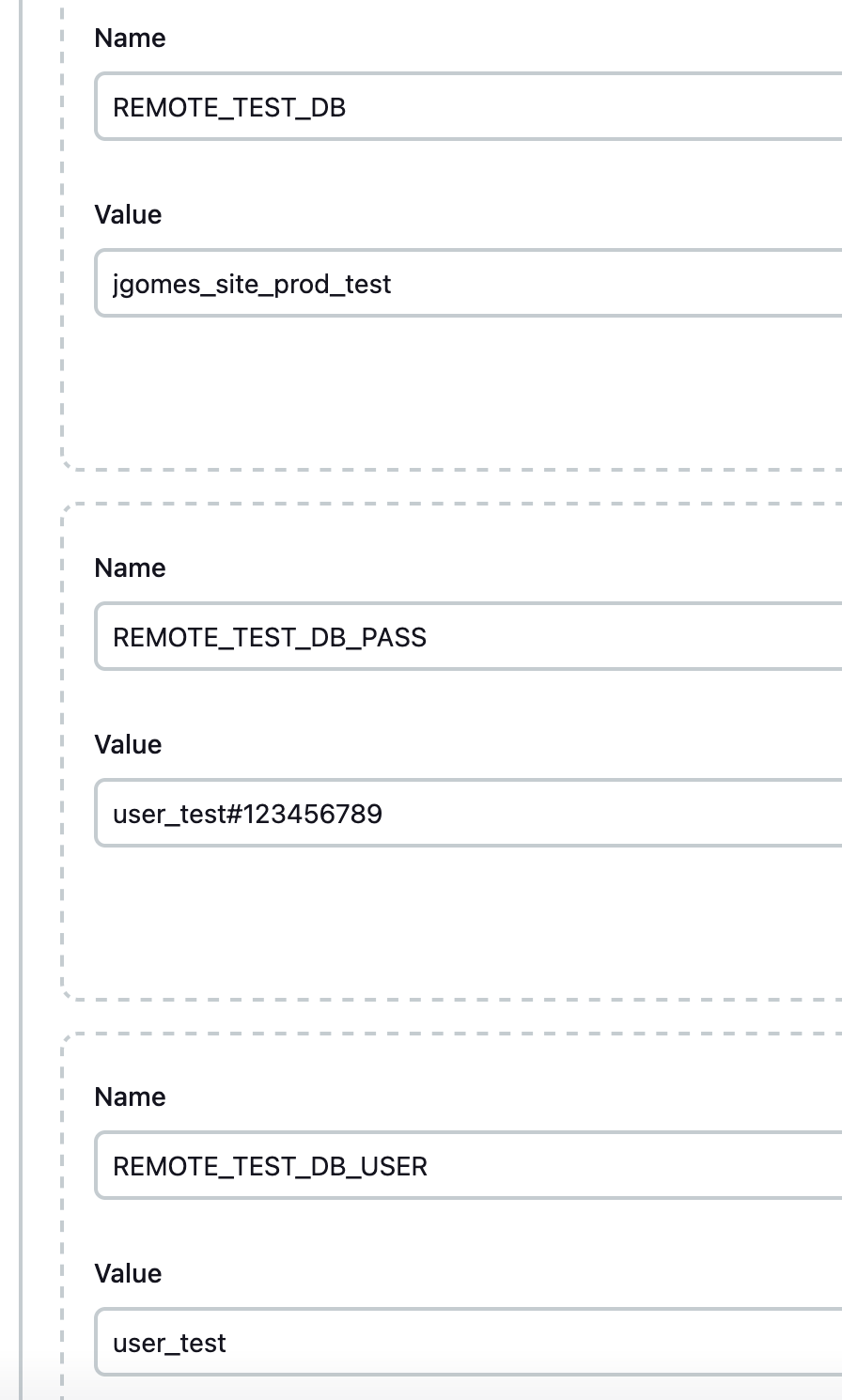

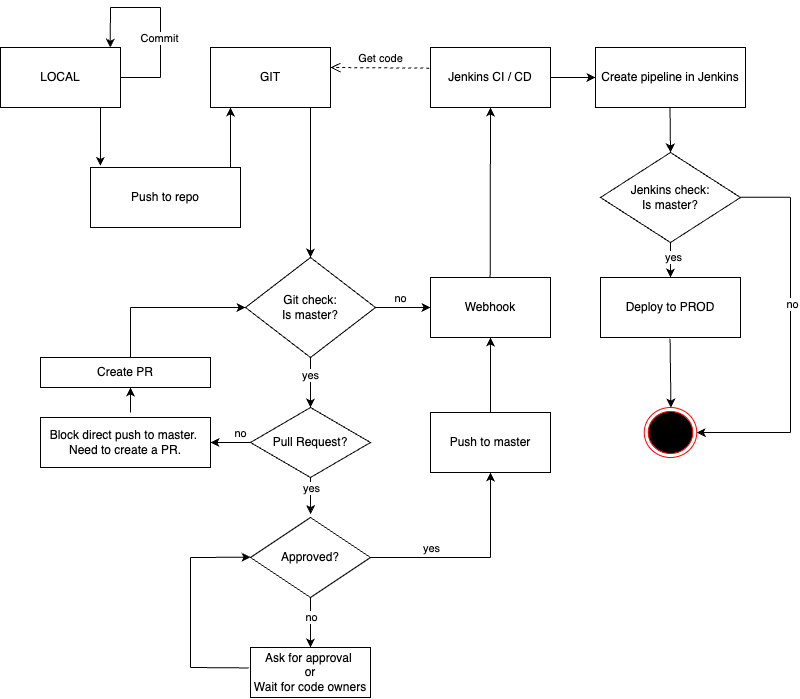
jenkins:
container_name: jgomes_jenkins
user: "1000:1002"
restart: always
build:
context: './prod-services/jenkins'
ports:
- "8891:8080"
- "50001:50001"
volumes:
- jenkins-data:/var/jenkins_home
depends_on:
- phpmyadmin
networks:
- jgomes-site_prod-docker
FROM jenkins/jenkins
USER root
# Adicionar o usuário Jenkins ao grupo sudo
RUN usermod -aG sudo jenkins
RUN echo 'jenkins:jenkins' | chpasswd && \
mkdir -p /etc/sudoers.d/ && \
echo 'jenkins ALL=(ALL) NOPASSWD:ALL' > /etc/sudoers.d/jenkins
# Adicional tool and extensions to PHP
RUN apt-get update \
&& apt-get install -y sudo vim curl iputils-ping nano php-cli php-curl php-xml php-json php-mbstring php-tokenizer php-xmlwriter libxml2-dev \
&& rm -rf /var/lib/apt/lists/*
RUN sudo apt-get install ca-certificates gnupg
RUN sudo install -m 0755 -d /etc/apt/keyrings
RUN curl -fsSL https://download.docker.com/linux/debian/gpg | sudo gpg --dearmor -o /etc/apt/keyrings/docker.gpg
RUN sudo chmod a+r /etc/apt/keyrings/docker.gpg
# Add the repository to Apt sources:
RUN echo \
"deb [arch=$(dpkg --print-architecture) signed-by=/etc/apt/keyrings/docker.gpg] https://download.docker.com/linux/debian \
$(. /etc/os-release && echo "$VERSION_CODENAME") stable" | \
sudo tee /etc/apt/sources.list.d/docker.list > /dev/null
RUN sudo apt-get update
# Add composer
RUN curl -sS https://getcomposer.org/installer | sudo php -- --install-dir=/usr/local/bin --filename=composer
<IfModule mod_ssl.c>
LoadModule proxy_module modules/mod_proxy.so
LoadModule proxy_http_module modules/mod_proxy_http.so
LoadModule headers_module modules/mod_headers.so
<VirtualHost *:443>
ServerAdmin zx.gomes@gmail.com
ServerName jjenkins.xyz
ErrorLog /var/log/apache2/jenkins_error.log
CustomLog ${APACHE_LOG_DIR}/jenkins_access.log combined
SSLEngine on
SSLCertificateFile /var/www/html/site-jgomes-prod-infra/certs/jenkins.crt
SSLCertificateKeyFile /var/www/html/site-jgomes-prod-infra/certs/jenkins.key
SSLCertificateChainFile /var/www/html/site-jgomes-prod-infra/certs/jenkins.ca-bundle
ProxyRequests Off
ProxyPass / http://localhost:8891/ nocanon
ProxyPassReverse / http://localhost:8891/
RequestHeader set X-Forwarded-Proto "https"
RequestHeader set X-Forwarded-Port "443"
<Location />
Order allow,deny
Allow from all
AllowOverride all
</Location>
</VirtualHost>
</IfModule>
<VirtualHost *:80>
ServerName jjenkins.xyz
ServerAlias www.jjenkins.xyz
Redirect permanent / https://jjenkins.xyz/
</VirtualHost>
SSLEngine on
SSLCertificateFile {path_to_file}/jenkins.crt
SSLCertificateKeyFile {path_to_file}/jenkins.key
SSLCertificateChainFile {path_to_file}/jenkins.ca-bundle
import groovy.json.JsonBuilder
def sshCredentials = null
def remoteUser = null
def remoteHost = null
def remoteProjectDir = null
def lastRemoteCommandError = null
def remoteCommandPrefix = null
def executeRemoteCommand(command, remoteCommandPrefix)
{
// Prepare full cmd
def remoteCommandComplete = "${remoteCommandPrefix} ${command}'"
// Tmp Jenkins to save thr logs
def outputFile = "/tmp/${command.hashCode()}_output.txt"
// Execute the remote command and redirect standard output and error to the file
def result = sh(script: "${remoteCommandComplete} > ${outputFile} 2>&1", returnStatus: true)
// Read standard output and error from the file
def outputContent = readFile(file: outputFile).trim()
// Return both output and exit code
return [output: outputContent, exitCode: result]
}
pipeline
{
agent any
stages
{
stage('Get ENV vars')
{
steps
{
script
{
sshCredentials = env.SSH_CREDENTIALS
remoteUser = env.REMOTE_USER
remoteHost = env.REMOTE_HOST
remoteProjectDir = env.REMOTE_PROJECT_DIR
remoteCommandPrefix = "ssh -o StrictHostKeyChecking=no ${remoteUser}@${remoteHost} 'cd ${remoteProjectDir} &&"
}
}
}
stage('Checkout')
{
steps
{
echo 'Do the checkout from the repo and put the code i this context.'
checkout scm
}
}
stage('Build')
{
steps
{
// Mandatory as I want to run unit tests using the phpunit from vendor
echo 'Run composer'
sh 'composer update'
// .env file is mandatory to generate app key
echo 'Copy dev .env file'
sh 'cp .env.test .env'
}
}
stage('Tests')
{
steps
{
echo 'Run tests'
sh 'vendor/bin/phpunit'
}
}
stage('Deploy')
{
when
{
// Only deploy to prod if master
expression
{
return (env.BRANCH_NAME == 'master')
}
}
steps
{
script
{
sshagent(credentials: [sshCredentials])
{
def commands = [
// Do deploy
'git reset --hard HEAD && git pull origin master',
// Do composer update, migration, and clean all backend caches
'APP_ENV=prod RABBIT_HOST=0.0.0.0 composer update && APP_ENV=prod RABBIT_HOST=0.0.0.0 php artisan migrate && APP_ENV=prod RABBIT_HOST=0.0.0.0 php artisan route:clear && APP_ENV=prod RABBIT_HOST=0.0.0.0 php artisan config:clear && APP_ENV=prod RABBIT_HOST=0.0.0.0 php artisan cache:clear',
// Do client files versioning
'npm cache clean --force && npm install && npm run production',
// Do phpunit report
'vendor/bin/phpunit --coverage-html storage/coverage-report && sed -i "s|<head>|<head><title>Coverage</title>|" "storage/coverage-report/index.html" && sed -i "s|<head>|<head><title>Dashboard</title>|" "storage/coverage-report/dashboard.html" && find "storage/coverage-report" -type f -exec sed -i "s#/var/www/html/site-jgomes-prod-infra/site-jgomes/app#(Coverage)#g" {} +'
]
for (command in commands)
{
def commandResult = executeRemoteCommand(command, remoteCommandPrefix)
if (commandResult.exitCode != 0)
{
lastRemoteCommandError = commandResult.output
currentBuild.result = 'FAILURE'
echo commandResult.output
error("The pipeline was interrupted during deployment while executing the command: ${command}")
return
}
}
}
}
}
}
}
post
{
failure
{
script
{
// Check of the branch is master
if (env.BRANCH_NAME == 'master')
{
sshagent(credentials: [sshCredentials])
{
echo "Send pipeline failure notification with the error.."
// Prepare error message
def jsonError = new JsonBuilder(lastRemoteCommandError).toPrettyString().replaceAll('"', '\\"')
// Prepare command
command = "APP_ENV=prod php artisan pipeline:result --result=nok --msg=${jsonError}"
// Execute command
executeRemoteCommand(command, remoteCommandPrefix)
}
}
}
}
success
{
script
{
// Check of the branch is master
if (env.BRANCH_NAME == 'master')
{
sshagent(credentials: [sshCredentials])
{
echo "Send pipeline success notification.."
// Prepare command
command = 'APP_ENV=prod php artisan pipeline:result --result=ok --msg=ok'
// Execute command
executeRemoteCommand(command, remoteCommandPrefix)
}
}
}
}
}
}
The Jenkins file above is a declarative script that defines a workflow for continuous integration and continuous delivery (CI/CD) of a PHP application.
Here's a summary of what each stage does:
In summary, this Jenkinsfile automates the process of continuous integration and delivery of a PHP application, from building to deployment in a production environment, using Jenkins and SSH for automation and status notification.




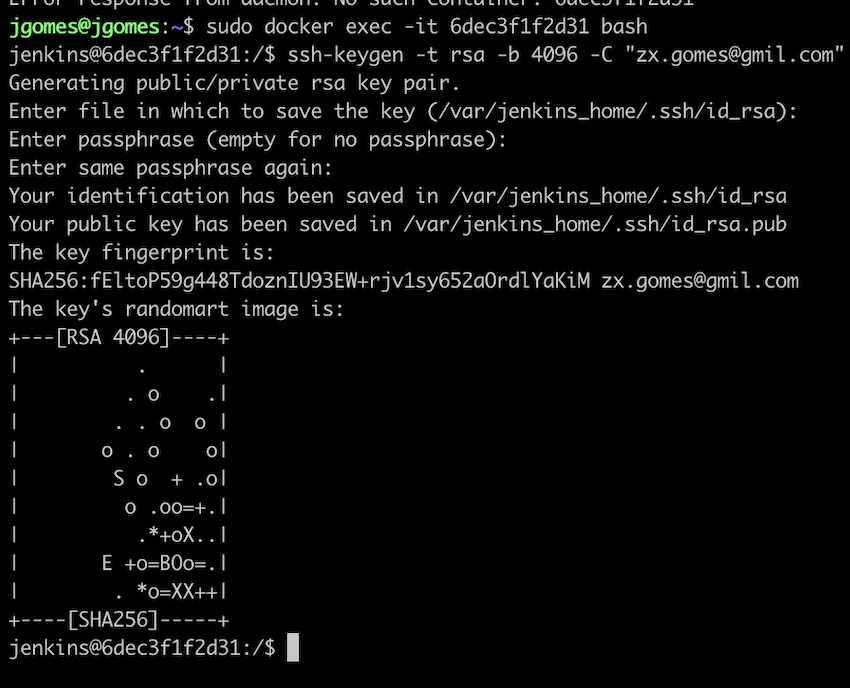
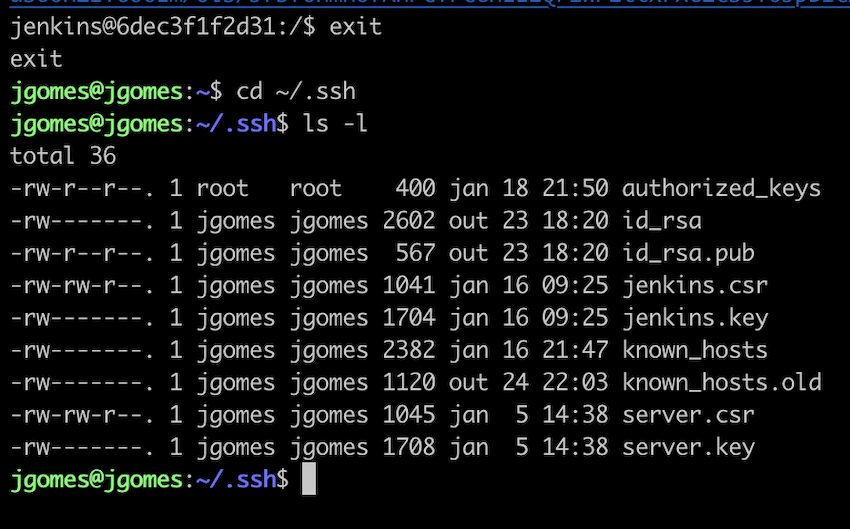
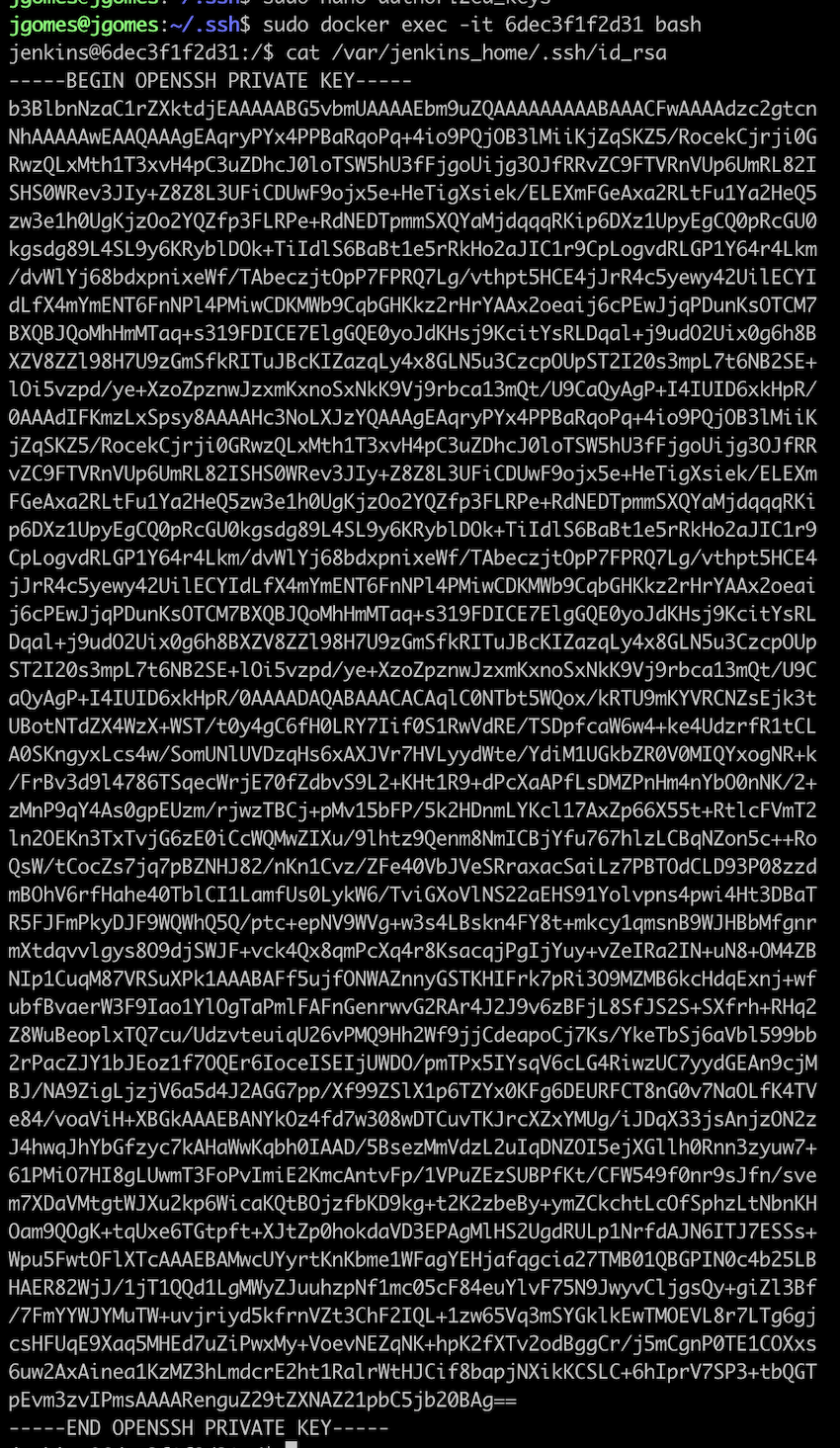
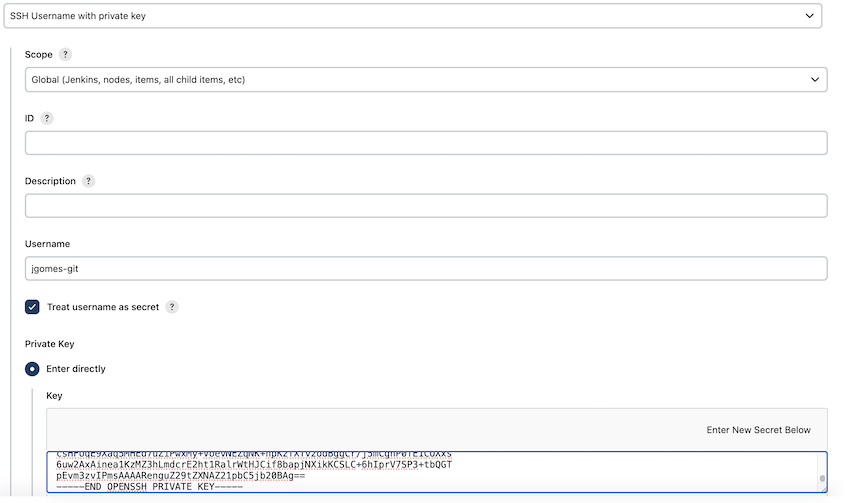
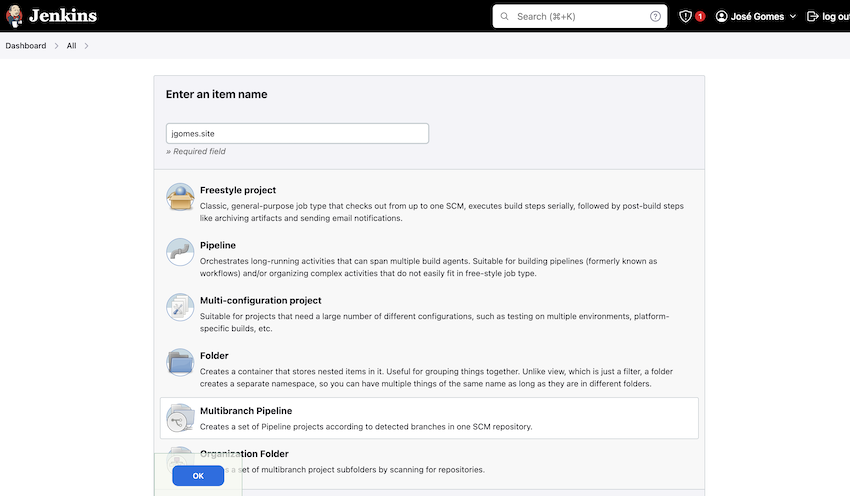
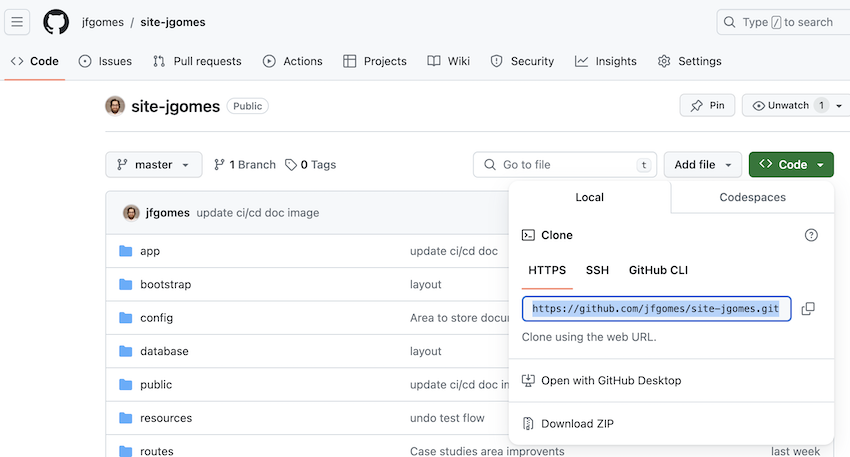

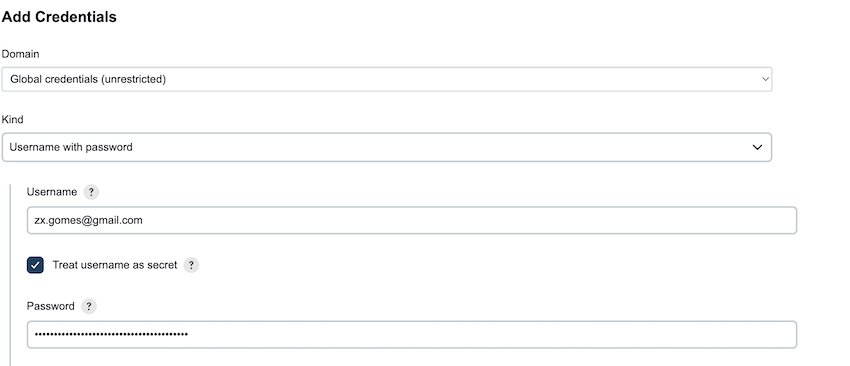
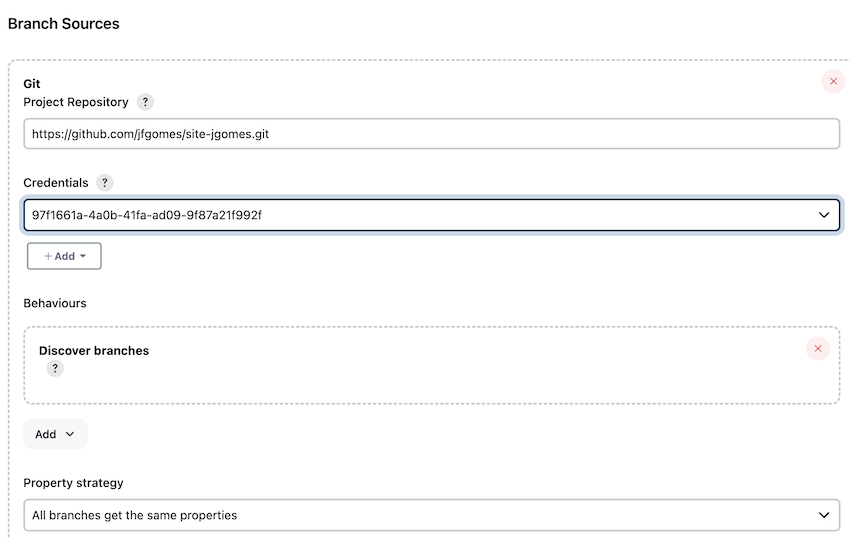
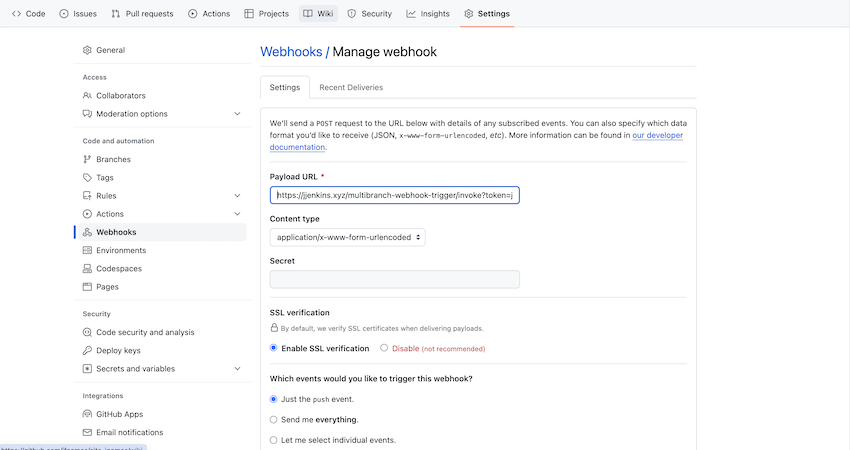
 sudo iptables-save
sudo iptables-save




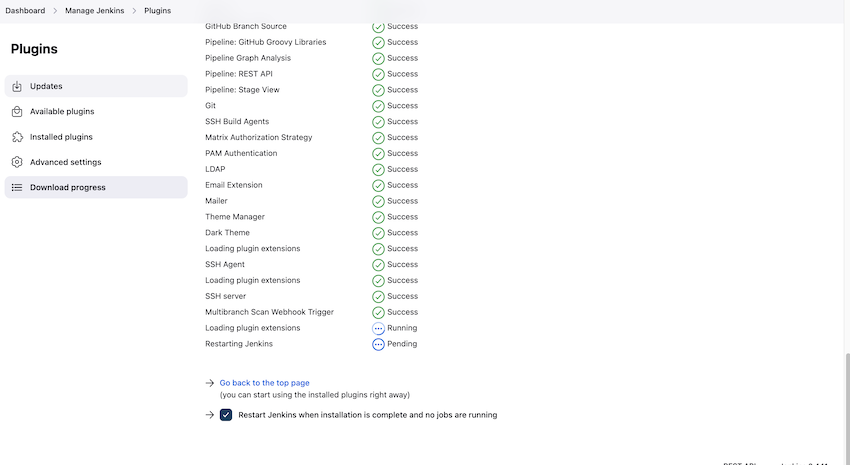
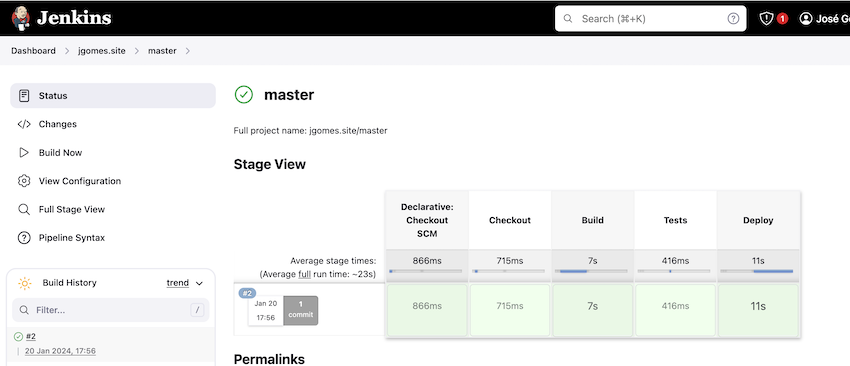
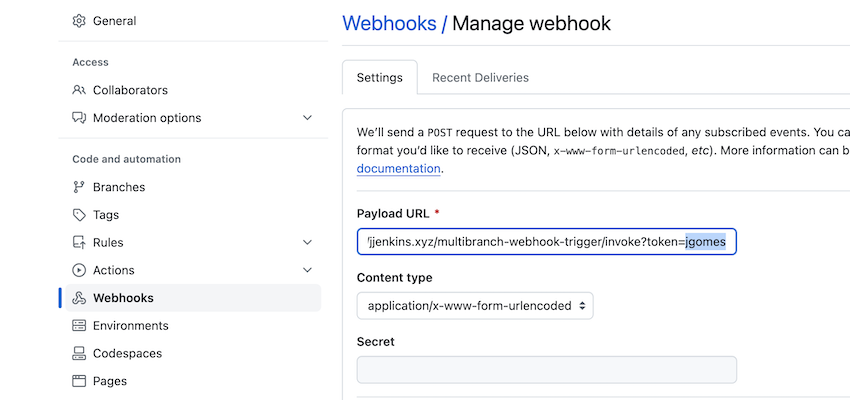
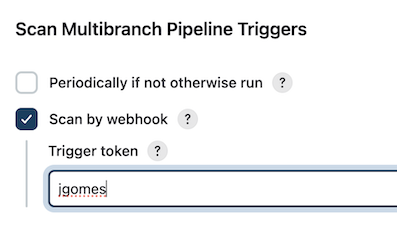
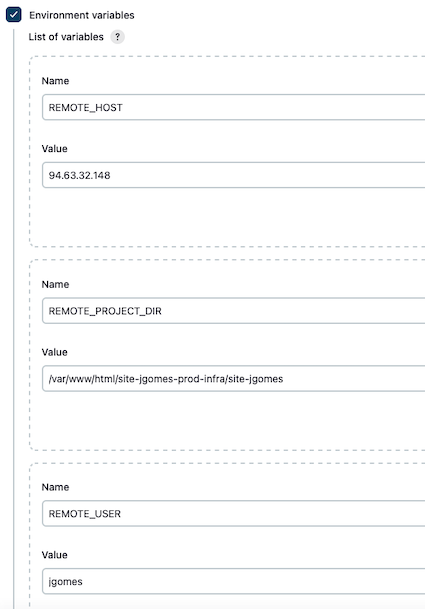
-- Drop the production/test user and database if they exist
DROP USER IF EXISTS 'user_prod'@'%';
DROP USER IF EXISTS 'user_test'@'%'; <----- here
DROP DATABASE IF EXISTS jgomes_site_prod;
DROP DATABASE IF EXISTS jgomes_site_prod_test; <----- here
-- Create the production database
CREATE DATABASE jgomes_site_prod;
CREATE DATABASE jgomes_site_prod_test; <----- here
-- Create the production user and grant permissions
CREATE USER 'user_prod'@'%' IDENTIFIED BY '******';
GRANT ALL PRIVILEGES ON jgomes_site_prod.* TO 'user_prod'@'%';
-- Create test user and grant permissions
CREATE USER 'user_test'@'%' IDENTIFIED BY '*****'; <----- here
GRANT ALL PRIVILEGES ON jgomes_site_prod_test.* TO 'user_test'@'%'; <----- here
-- Flush privileges to apply changes
FLUSH PRIVILEGES;
import groovy.json.JsonBuilder
def sshCredentials = null
def remoteUser = null
def remoteHost = null
def remoteProjectDir = null
def lastRemoteCommandError = null
def remoteCommandPrefix = null
def executeRemoteCommand(command, remoteCommandPrefix)
{
// Prepare full cmd
def remoteCommandComplete = "${remoteCommandPrefix} ${command}'"
// Tmp Jenkins to save thr logs
def outputFile = "/tmp/${command.hashCode()}_output.txt"
// Execute the remote command and redirect standard output and error to the file
def result = sh(script: "${remoteCommandComplete} > ${outputFile} 2>&1", returnStatus: true)
// Read standard output and error from the file
def outputContent = readFile(file: outputFile).trim()
// Return both output and exit code
return [output: outputContent, exitCode: result]
}
pipeline
{
agent any
stages
{
stage('Get ENV vars')
{
steps
{
script
{
sshCredentials = env.SSH_CREDENTIALS
remoteUser = env.REMOTE_USER
remoteHost = env.REMOTE_HOST
remoteProjectDir = env.REMOTE_PROJECT_DIR
remoteCommandPrefix = "ssh -o StrictHostKeyChecking=no ${remoteUser}@${remoteHost} 'cd ${remoteProjectDir} &&"
remoteTestDB = env.REMOTE_TEST_DB <----- here
remoteTestDBUser = env.REMOTE_TEST_DB_USER <----- here
remoteTestDBPass = env.REMOTE_TEST_DB_PASS <----- here
remoteTestCommandPrefix = "DB_DATABASE=${remoteTestDB} DB_USERNAME=${remoteTestDBUser} DB_PASSWORD=${remoteTestDBPass}" <----- here
}
}
}
stage('Checkout')
{
steps
{
echo 'Do the checkout from the repo and put the code i this context.'
checkout scm
}
}
stage('Build')
{
steps
{
// Mandatory as I want to run unit tests using the phpunit from vendor
echo 'Run composer'
sh 'composer update'
// Start MySQL with skip-grant-tables
sh 'sudo mysqld_safe --skip-grant-tables &'
// .env file is mandatory to generate app key
echo 'Copy dev .env file'
sh 'cp .env.test .env'
// App key is mandatory to run tests
// echo 'Generate application key'
// sh 'php artisan key:generate'
sh 'php artisan migrate'
}
}
stage('Tests')
{
steps
{
echo 'Run tests'
sh 'vendor/bin/phpunit'
}
}
stage('Deploy')
{
when
{
// Only deploy to prod if master
expression
{
return (env.BRANCH_NAME == 'master')
}
}
steps
{
script
{
sshagent(credentials: [sshCredentials])
{
def commands = [
// Do deploy
'git reset --hard HEAD && git pull origin master',
// Do composer update, migration, and clean all backend caches
'APP_ENV=prod RABBIT_HOST=0.0.0.0 composer update && APP_ENV=prod RABBIT_HOST=0.0.0.0 php artisan migrate && APP_ENV=prod RABBIT_HOST=0.0.0.0 php artisan route:clear && APP_ENV=prod RABBIT_HOST=0.0.0.0 php artisan config:clear && APP_ENV=prod RABBIT_HOST=0.0.0.0 php artisan cache:clear',
// Do client files versioning
'npm cache clean --force && npm install && npm run production',
// Create testing DB to do phpunit report after
"${remoteTestCommandPrefix} php artisan migrate", <----- here
// Do phpunit report
"${remoteTestCommandPrefix} vendor/bin/phpunit --coverage-html storage/coverage-report && sed -i \"s|<head>|<head><title>Coverage</title>|\" \"storage/coverage-report/index.html\" && sed -i \"s|<head>|<head><title>Dashboard</title>|\" \"storage/coverage-report/dashboard.html\" && find \"storage/coverage-report\" -type f -exec sed -i \"s#/var/www/html/site-jgomes-prod-infra/site-jgomes/app#(Coverage)#g\" {} +" <----- here
]
for (command in commands)
{
def commandResult = executeRemoteCommand(command, remoteCommandPrefix)
if (commandResult.exitCode != 0)
{
lastRemoteCommandError = commandResult.output
currentBuild.result = 'FAILURE'
echo commandResult.output
error("The pipeline was interrupted during deployment while executing the command: ${command}")
return
}
}
}
}
}
}
}
post
{
failure
{
script
{
// Check of the branch is master
if (env.BRANCH_NAME == 'master')
{
sshagent(credentials: [sshCredentials])
{
echo "Send pipeline failure notification with the error.."
// Prepare error message
def jsonError = new JsonBuilder(lastRemoteCommandError).toPrettyString().replaceAll('"', '\\"')
// Prepare command
command = "APP_ENV=prod php artisan pipeline:result --result=nok --msg=${jsonError}"
// Execute command
executeRemoteCommand(command, remoteCommandPrefix)
}
}
}
}
success
{
script
{
// Check of the branch is master
if (env.BRANCH_NAME == 'master')
{
sshagent(credentials: [sshCredentials])
{
echo "Send pipeline success notification.."
// Prepare command
command = 'APP_ENV=prod php artisan pipeline:result --result=ok --msg=ok'
// Execute command
executeRemoteCommand(command, remoteCommandPrefix)
}
}
}
}
}
}
